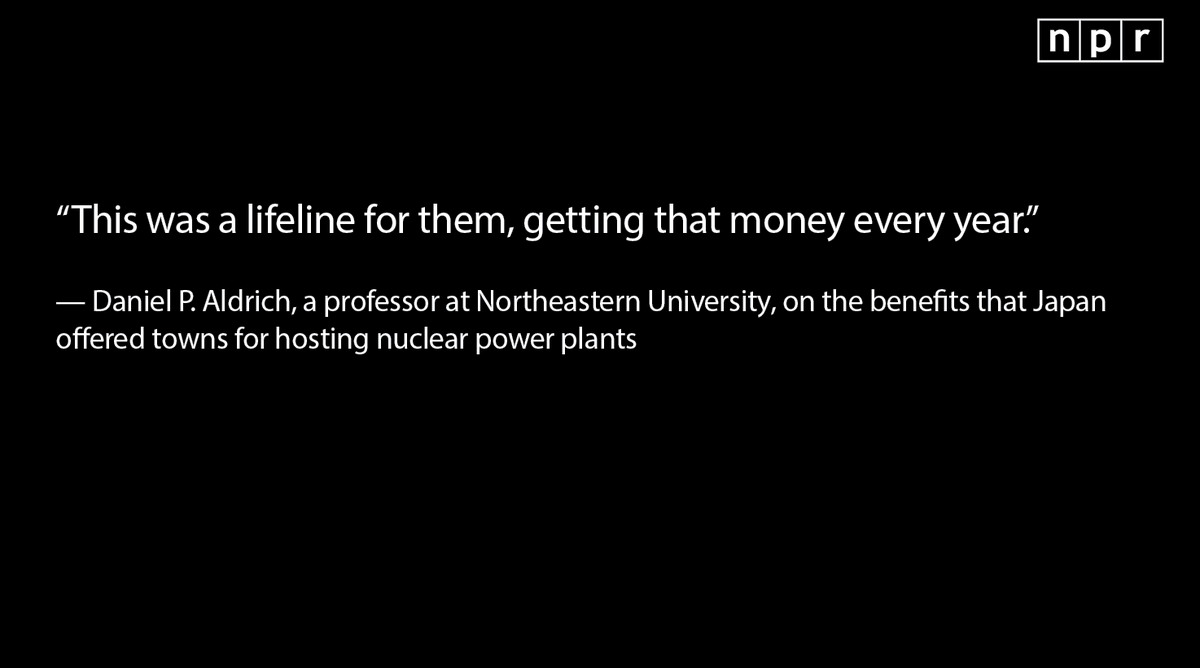
Nearly a decade ago, Fukushima was devastated by one of the world’s biggest nuclear disasters.
Since then, Japan has poured billions of dollars into recovery.
But what does recovery really mean?
We traveled there to find out. trib.al/5w0GFXt
Since then, Japan has poured billions of dollars into recovery.
But what does recovery really mean?
We traveled there to find out. trib.al/5w0GFXt
In the 1960s & '70s, Japan’s energy demands were rising along with its economic power. But the country had few homegrown fuel sources.
So, it began offering rural communities money to host nuclear power plants.
So, it began offering rural communities money to host nuclear power plants.

54 nuclear reactors were built across a country rich in fault lines, active volcanoes and tsunami-prone coasts.
It was risky. But experts stressed the safety of nuclear power.
By the early 2000s, it accounted for over a quarter of Japan’s electricity. trib.al/5w0GFXt
It was risky. But experts stressed the safety of nuclear power.
By the early 2000s, it accounted for over a quarter of Japan’s electricity. trib.al/5w0GFXt
A triple disaster in 2011 forced Japan to take a hard look at its nuclear choice.
A record-breaking earthquake sent a massive tsunami crashing into the northern coast — sweeping nearly 20,000 people into the sea.
It also hit the Fukushima Daiichi Nuclear Power Plant.
A record-breaking earthquake sent a massive tsunami crashing into the northern coast — sweeping nearly 20,000 people into the sea.
It also hit the Fukushima Daiichi Nuclear Power Plant.
3 reactors exploded, blanketing nearby communities in radioactive material.
Officials scrambled to relocate the population, drawing a mandatory evacuation zone within a 12.4-mile radius.
In reality, the radioactive material had traveled much farther.

Officials scrambled to relocate the population, drawing a mandatory evacuation zone within a 12.4-mile radius.
In reality, the radioactive material had traveled much farther.


Today, homes and businesses sit abandoned — rotting and overgrown.
As cleanup continues, officials have deemed parts OK for return — lifting restrictions in an ad hoc manner that often means an accordion gate is the only barrier separating “safe” & “unsafe” areas.
As cleanup continues, officials have deemed parts OK for return — lifting restrictions in an ad hoc manner that often means an accordion gate is the only barrier separating “safe” & “unsafe” areas.
Still, only a fraction of the 160,000 evacuees have returned.
Large parts of the two towns that host Daiichi — Futaba and Okuma — remain behind gates.
Residents can only visit for hours at a time.
Many say they feel a mix of nightmare and nostalgia when they do.
Large parts of the two towns that host Daiichi — Futaba and Okuma — remain behind gates.
Residents can only visit for hours at a time.
Many say they feel a mix of nightmare and nostalgia when they do.

As for Japan's nuclear power sector, only 9 of the 54 reactors are currently producing power.
Many are slated for decommissioning, including all 6 at Daiichi.
It’s estimated the process at Daiichi alone will take over 40 years and around $200 billion.
Many are slated for decommissioning, including all 6 at Daiichi.
It’s estimated the process at Daiichi alone will take over 40 years and around $200 billion.

“The government and the utilities keep saying that nuclear power is the cheapest power source, but people don’t trust it anymore,” says a former nuclear engineer.
He says it's impossible to see it as cheaper when you include the cost of Fukushima. trib.al/5w0GFXt
He says it's impossible to see it as cheaper when you include the cost of Fukushima. trib.al/5w0GFXt

This story is from a series reported by @thejohnaproject fellow @lilkat_bigworld.
She and @nprviz photographer Claire Harbage spent February and March in Japan, learning about the triple disaster in Fukushima and those affected by it.
More here: trib.al/5w0GFXt
She and @nprviz photographer Claire Harbage spent February and March in Japan, learning about the triple disaster in Fukushima and those affected by it.
More here: trib.al/5w0GFXt
• • •
Missing some Tweet in this thread? You can try to
force a refresh




